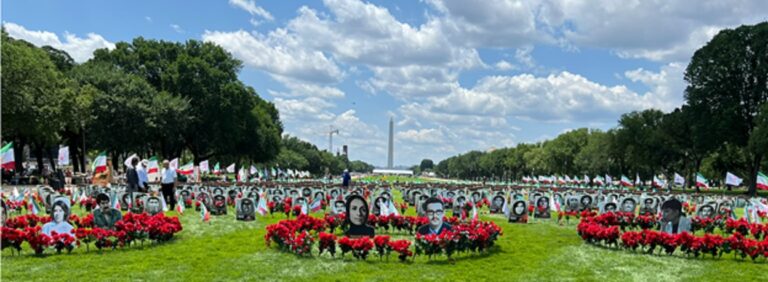Free Iran Scholar Network | Shirin Nariman | Aug. 22, 2025
Shirin Nariman is a former political prisoner in Iran during the 1980s.
As a former political prisoner in Iran, I witnessed horrors that remain etched into my memory, nightly executions, the shouts of tortured inmates, and the constant fear that any moment could be your last. I survived the blood-soaked decade of the 1980s, only to later learn that during the summer of 1988, thousands of my fellow political prisoners including members of my own family and closest friends were systematically murdered in one of the darkest crimes of the 20th century.
Sadly, I see the same signs repeating today. The Islamic Republic is once again escalating its campaign of terror against political prisoners.
Just few weeks ago, two political prisoners, Behrouz Ehsani and Mohammad Hassani, both known supporters of the People’s Mojahedin Organization of Iran (PMOI/MEK), were executed following a violent raid on Ghezel Hesar Prison. Inmates were beaten, dispersed, and transferred to unknown locations. Political prisoner Saeid Massouri was exiled to Zahedan Prison. Others simply disappeared.
Now, the situation has grown even more dire. According to credible reports, five more political prisoners Saeid Noori, Ali Haghdoost, Ebrahim Mohammad Ali, Sadegh Tahmoures, and Mohammad Ali Salehi, are at imminent risk of execution after being abruptly transferred to Ghezel Hesar Prison’s notorious execution ward. This is the exact pattern the regime used before the 1988 massacre: isolate, transfer, and kill without warning.
A few weeks earlier, the brilliant student activist Ali Younesi was suddenly separated from others and taken to an unknown location. His co-defendant, Amir Hossein Moradi, was brought before a court for new charges, clearly a prelude to further punishment.
What makes this wave of repression even more dangerous is that it now extends beyond the prison walls. Families of political prisoners and dissidents are being harassed, intimidated, and targeted. A heartbreaking example is the recent arrest of Leila Saremi, daughter of the late Ali Saremi, a well-known MEK supporter executed in 2010. Just two weeks ago, Leila and her husband were both arrested. She is also the mother of Farzad Moazami, a young political prisoner. This multigenerational targeting is a chilling reminder that the regime does not stop at punishing individuals—it goes after entire families.
This moment demands immediate action from the international community. Human rights groups, democratic governments, and world leaders must go beyond issuing statements. The time for moral condemnation has passed what is needed now is measurable consequence.
The first step is clear: deny Iranian President Masoud Pezeshkian a visa to attend the UN General Assembly in September. Allowing him to appear on the global stage legitimizes a regime that is actively executing dissidents, silencing families, and repeating the same patterns of mass murder we saw in the 1980s. Denying his entry would send the strongest possible message that the world will no longer provide a platform to dictators who trample human rights. History has shown time and again that when world leaders choose to act decisively, they can set the stage for justice and stand firm against dictators and predators—and ultimately defeat them. A powerful precedent is South Africa in the late 1980s, when global action helped dismantle apartheid.
During the apartheid era in South Africa, international pressure from economic sanctions to diplomatic expulsions played a crucial role in ending institutionalized oppression. The same tools must be used against the Iranian regime.
Governments should consider:
- Denying visas to regime officials like Pezeshkian and preventing their participation in international forums.
- Shutting down or minimizing Iranian embassies and consulates in their countries.
- Expelling Iranian diplomats, particularly those tied to intelligence operations and the IRGC.
- Freezing assets linked to regime officials involved in repression and executions.
- Supporting a UN-led independent inquiry into the 1988 massacre and current political executions.
- Imposing travel bans on judges and prison authorities complicit in torture and death sentences.
These are not radical steps, they are proportionate, necessary responses to a regime that has shown no willingness to reform and every intention to kill its way through dissent.
Despite its brutality, the Islamic Republic is far weaker than it appears. Public dissatisfaction in Iran is at a boiling point. Daily electricity outages, an intensifying water crisis, sky-high food prices, and a collapsing economy have plunged millions into poverty. The population is exhausted and increasingly unafraid.
The real threat to the regime is not an outside invasion. It is its own people.
The fear that once silenced the Iranian people is dissipating. In its place is a growing readiness to rise again, as they did in 2017, 2019, and 2022. But this time, the regime lacks the resources, international legitimacy, and even the internal unity it once had to fully suppress a nationwide uprising.
The collapse of this regime will not only liberate the Iranian people, it will bring peace to the entire region. The Islamic Republic is the source of proxy wars, sectarian violence, and terrorism stretching from Lebanon to Yemen. Ending its grip on power means ending much of the instability plaguing the Middle East.
As someone who has survived the worst of this regime’s brutality, I urge the international community not to wait for another mass grave to speak up. Every delay costs lives.
We owe it to the memory of those already lost and to the people who continue to resist behind prison walls and in the streets of Iran to act now.
https://freeiransn.com/echoes-of-the-1980s-a-warning-from-a-former-political-prisoner/

